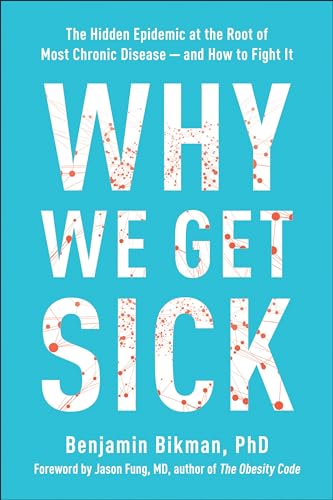In today’s interview I get to speak with Associate Professor, Dr Ben Bikman, about how insulin resistance makes us sick, causing more than just diabetes. He is also back to answer some of your commonly asked questions.
In a previous interview with Ben we talked about what insulin resistance was, how to test for it and Ben also gave us advice about the best diet for bringing insulin resistance back to normal.
Today, we talk more about what the latest research says about how insulin resistance is at the root cause of many diseases.
From heart disease, to kidney disease and Alzheimer’s, Ben explains how we can improve or prevent a number of conditions by keeping our insulin levels healthy.
- What is making us sick
- How insulin resistance is connected to a wide range of non-communicable disease
- Why insulin is a better marker than glucose
- Are low ketones and too much a problem?
- What happens when you combine fat and carbohydrates?
- Advice on mitigating the insulin response
Then this interview is for them.
I always enjoy talking to Ben and was glad to have him back sharing some more of his nuggets of wisdom.
Special thanks to Ben for joining me on the show.
Enjoy the episode!


Listen to The Podcast Episode
Hear episode 107 interview directly on your favorite podcast app by clicking a link below:
Guest’s Links

Follow, or find out more about Ben on these official links:
Show Notes with Timestamp Links
Find summarised highlights of what we talk about during the interview.
Use the clickable timestamp links to jump directly to those points in the audio file below:
[00:19] – Introducing, Dr Ben Bikman, Associate Professor at BYU who does research on obesity and metabolism. His new book “Why We Get Sick” is coming out in July, 2020 and is available on Amazon.
[01:23] – Ben gives us a little background on his new book which covers insulin resistance, why it matters, how it ties into why we get sick, as well as what to do about it.
[03:00] – Ben explains why he believes that much of non-infectious chronic disease is in some ways connected to insulin resistance.
[04:35] – This is why lifestyle intervention – what you eat – is a crucial part to improving your health. If we can look at insulin resistance as more than just a precursor to diabetes we can intervene in the progression of many other disorders that it’s connected to.
[06:47] – In the book, Ben gives details about tests you can do to measure insulin resistance and about the utility of measuring fasting insulin itself. When possible, insulin should be measured during a glucose challenge.
[07:46] – Often glucose can be normal, but there is a problem with insulin. Ben is adamant we should be shifting our focus to insulin for better diagnosis and treatment of diabetes as well as many other conditions.
[09:15] – High blood pressure is a common condition that is insulin related. Tim explains others include kidney disease and Alzheimer’s disease. Insulin resistance can accelerate the ageing of the brain!
[12:13] – Insulin and protein. Ben shares his thoughts on the carnivore diet and insulin resistance. Data has shown that protein + carbohydrates = insulin spike but protein alone = no significant spike in insulin. Ben explains possible reasons for this. [17:09] – One benefit of the carnivore diet is that it’s a very pure way of eating without any processed food. However, Ben believes a low-carb diet is more attainable but still extremely powerful in lowering insulin resistance. [18:39] – Low ketones on a carnivore diet? What is happening with the insulin? Ben suspects that ketone levels might have been high to begin with in these individuals and their bodies have become more adept at using the ketones. [20:29] – What could happen to the insulin response when we eat a lot of saturated fat (in particular stearic acid) along with carbohydrates? Ben talks metabolic flexibility to help explain the success with this type of diet. [25:09] – Ben argues that it is healthy to be exposed to a variety of different types of fats. We should be getting long, medium and short-chain-fatty-acids as well as fermented foods. [29:36] – Linolenic acid in vegetable oils is a polyunsaturated omega-6 and is essential in the diet, however, it is everywhere and we don’t need to worry about getting enough. Problem is also that it is very well oxidised and can easily become dangerous. [35:28] – Hard tummy (fat beneath the muscle) vs soft tummy (fat right beneath the skin). Ben explains that if its jiggles it is good and is healthier in a number of ways! [37:00] – Dietary fat alone does not increase insulin. Ben explains that in general you don’t want to be spiking insulin and eating fat, e.g doughnut is a bad combination of high fat and high carb.[39:27] – Often when people go carnivore they also go OMAD. This is beneficial to the insulin response. Ben believes to improve or maintain insulin response it is ideal to eat less frequently and is a strong advocate of eating 2-3 meals a day, max.
[44:07] – Ben’s priority is family life and he explains why this makes one meal a day a challenge for him and how sleep is easier with a lighter meal for dinner.
[46:41] – Vinegar will mitigate some of the insulin effect of a carbohydrate. Ben drinks sparkling water with a shot of apple cider vinegar with his meal. Ben’s other tip is he also recommends putting the carbohydrate at the end of the meal for a reduced insulin effect.
[48:03] – High fat meal replacement shakes (ideally also high in protein) can be very effective in curbing hunger, but should be considered a meal, not a snack. Ben also has a shake coming out in the next few months (HLTH); it is in a 1:1 fat to protein ratio by mass.
[50:32] – For people who like to eat breakfast, start the day by focusing on the essential: fat and protein.
[51:22] – More and more evidence shows that pure fructose is unhealthy for the liver, promoting liver insulin resistance. Don’t drink fruit!
[53:49] – For anyone wanting to find out more and keep up to date on the latest research follow Ben on Twitter and Instagram. He also has a public Facebook profile.